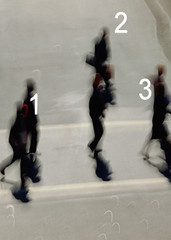Its message is clear. The risk is minimal to 40,000 patients who must be tested for hepatitis C as well as hepatitis B and HIV. Only six patients have been proven to be diagnosed with acute hepatitis C. Except… Except…
We’re not really talking about numbers. We’re talking about people.
Numbers don’t tell stories; people do.
My longtime friend and colleague Keith Sheldon, for example, is not a number. He’s a person. He’s also one of the many who never learned he needed to be tested because of a letter. He learned, like thousands of other patients, through the media.
“I was sitting in bed with my wife reading the Saturday paper,” Sheldon said. “At first, I didn’t think the crisis applied to me.”
It wasn’t until his wife started crying that his initial reaction, things like this happen to other people, didn’t apply. Sheldon was not only at risk, but had unknowingly put his wife at risk. And learning the center was notifying patients by letter and setting up a foundation was little consolation.
“As soon as I learned my health was at risk, I immediately made an appointment with my doctor,” he said. “He saw me the same morning … when it comes to your health, you don’t wait for red tape.”
It didn’t matter to Sheldon that he had to pay out of pocket for the test, despite promises that the center had already made arrangements with various health insurance providers. He needed answers … answers that still haven’t arrived. Because of the number of people being tested, most results will not be made readily available for seven to 10 days, which is next Monday or Tuesday at best.
“I hold the clinic’s management responsible for this disaster,” Sheldon said. “Specifically those individuals who had the day-to-day responsibility and oversight for how business was conducted.”
Recently, one doctor, who was employed at the center and asked the Las Vegas Review-Journal for anonymity because he fears "retaliation" from Dr. Desai (majority owner of the Endoscopy Center of Southern Nevada), said he left the clinic in 2000 — which places the start of the unsafe practices back to more than a decade — because he "was so depressed." He was reprimanded several times, the article says, because he was allegedly pressured to perform unnecessary biopsies, coupled with fabricated lengthy patient examinations, that could add more than $300 to a bill.
"It was so unethical," he said. "I couldn't live with myself."
As more stories surface, it seems to be that the entire practice was built on the concept of placing profits before people. By the account, it was always about playing the numbers: Reusing a single dose vial or the same syringe here and an extra biopsy there, well, it could help the clinic pay the bills.
Sheldon, who also teaches public relations and assists companies in crisis communication situations, is also mortified by the lack of empathy or apology by the center. From a business, ethical, and public relations perspective, the clinic is doing a dismal job of handling this crisis, he said.
“Rather than waste thousands of dollars on a poorly written, ill-conceived and
disingenuous full-page ad in the Review-Journal, the Endoscopy Center should have offered to pay for people to have their blood tested immediately,” he said. “ You just cannot put profit over people.”
When asked how the clinic might have responded, Sheldon offered…
“We demonstrated dismal judgment. We lost track of our mission of taking care of our patients to the best of our ability. We put profits over patients. For these transgressions, we are sorry. We pledge to make full restitution to the degree determined by the courts.”
I wholeheartedly agree. Anytime a company has surrendered all measure of professional efforts, there is nothing left to be done other than offer full disclosure, pledge full restitution, and permanently resign from the medical profession. These are not numbers; they are people — 40,000 people who are slowly learning through the media that they and their families — wives, husbands, sons, daughters — are at risk, one person at a time.
And, worse, it seems more and more clear every day that the numbers like six people infected and 40,000 at minimal risk, are designed to diminish the impact of real people, are growing every day. Dr. Desai ran six number-crunching clinics in southern Nevada. And, it has already become clear that the first clinic only offered a truncated list with 40,000 patients. Many more patients need testing.
For all of them, restitution seems obvious.
• Direct and full compensation for all testing without any fees being passed on to insurance companies.
• Free counseling for patients who are having challenges coping with the situation.
• Compensation for the pain, suffering, and anguish caused to the thousands of people put in harm’s way.
• The maximum amount paid out in medical malpractice to anyone who has to endure a shortened lifespan and risk of infecting loved ones as well as compensation to their families.
• The pledge that none of the management team will ever work in the medical profession again.
These are the only numbers we’re interested in reading about. As for the rest, it’s all about people. People you know and people who may never know if they are infected.
When handling a crisis, always put people first.
Sheldon offers up some hard but true advice for companies that abuse public or employee trust: “Would you have treated members of your family like this?”
The answer, more than likely, would be no. But we can only assume that. Other than the one-page advertisement that claimed patients should still have trust in the clinic, Dr. Desai isn’t talking.

















